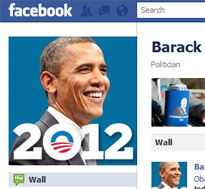Political campaigns embraced online media such as websites and blogs in the 2004 presidential election. However, campaign 2008 was truly the first time that Web 2.0 technologies — those that allow for more wide-open social interactivity and networking — played a major role in a presidential race. One outstanding research question remains whether or not such technologies will ultimately narrow or broaden the marketplace of ideas to which citizens are exposed.
A 2010 study by Pennsylvania State University researchers published in the journal Mass Communication and Society, “The 2008 Presidential Election, 2.0; A Content Analysis of User-Generated Political Facebook Groups,” examines the dynamics of user-generated Facebook groups relating to presidential candidates Barack Obama and John McCain. The researchers examine 139 candidate-themed Facebook pages for visual and textual references on November 3, 2008 (the day before the election), and coded each referent as conveying a positive, negative, or neutral connotation. The researchers look broadly at questions of Internet polarization — the phenomenon of citizens gathering in increasingly more narrow ideological groups and information environments.
Key study findings include:
- User-generated Facebook pages pertaining to Barack Obama were more popular and more active than those pertaining to John McCain; an Obama page averaged 10,345 friends and 635 posts, while a McCain page averaged 1,350 friends and 264 posts.
- Comments referring to Obama were 47% positive and 19% negative; comments referring to McCain were 31% positive and 28% negative.
- “Obama-focused pages also contained a higher number of references to race, whereas McCain-focused pages featured a significantly greater number of instances of profanity.”
- Age and race comments with positive connotations on McCain-focused sites were virtually nonexistent; however, 56% of all age-related comments were negative ones directed towards McCain.
- “The presence of [age-related, race-related] referents could be reflective of the dominant themes on Facebook but more plausibly reflect themes that were prevalent in mainstream media at the time.”
- The findings “may suggest that people are using Facebook groups to gather rather than share information, or possibly as a mere token gesture of support for a certain candidate or publication of their political allegiances.”
The researchers note that Facebook groups featuring McCain were “overwhelmingly negative. Although this might not be surprising given the fact that younger demographics of people more heavily supported Obama, it leads to greater questions about the use of social media as a tool for promoting dialogue between people of different political allegiances.”
Tags: Facebook, presidency, campaigns and media, social media


Expert Commentary